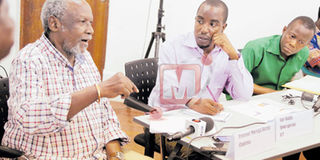Study: 60pc of Tanzanians want new constitution

Chadema Central Committee, Prof Mwesiga Baregu (left) speaks during a meeting in Dar es Salaam yesterday of Twaweza meeting to launched report of Constitution draft. Second left is ACT- Wazalendo Ideology Communication and Publicity Secretary, Ado Shaibu and right is the CCM Ideology and Publicity Secretary, Mr Humphrey Polepole. PHOTO | ANTHONY SIAME
What you need to know:
- The brief, titled ‘Unfinished Business: Tanzanians’ views on the stalled constitutional review process’ is based on data from Sauti za Wananchi, a nationally representative mobile phone survey.
- The findings are based on data collected from 1,745 respondents across Mainland Tanzania between June and July.
Dar es Salaam. Two out of three Tanzanians think it is time the country gets a new constitution, according to findings of a new Twaweza study revealed yesterday.
The brief, titled ‘Unfinished Business: Tanzanians’ views on the stalled constitutional review process’ is based on data from Sauti za Wananchi, a nationally representative mobile phone survey.
The findings are based on data collected from 1,745 respondents across Mainland Tanzania between June and July.
The findings show that just over half of respondents (56 per cent) think that the final draft Constitution should be voted in a public referendum.
However, the survey further showed that half of citizens (48 percent) believe that the process to write a new mother law will not happen within the next three years.
Yet, citizens expressed support towards having a constitution that emphasizes accountability.
Eight out of ten want ministerial appointments to be confirmed by Parliament (79 per cent), and six out of ten want to be able to remove MPs between elections (64 per cent).
Twaweza’s executive director Aidan Eyakuze said citizens want a new constitution.
“Many want to start with a new commission and a clean sheet of paper. But others are willing to go forward with the draft from the last commission,” he said.
“They also support the accountability orientation of the original draft constitution and they are clear that they want a new, more inclusive process to move forward with,” he observed.
Debating the findings, CCM’s Ideology and Publicity secretary Humphrey Polepole said CCM’s priority was to instil the concept of constitutionalism in the minds of Tanzanians.
“Constitutionalism should sink deep in the minds of the people, especially political leaders in order to smoothen its implementation; this is why CCM is reforming its institutions in order to achieve the goal,” he argued.
According to him reviving the Katiba re-writing process without the aforementioned reforms would have no benefit to the people and the country.
However, Mr Deogratius Bwire, from the Tanzania Human Rights Defenders Coalition (THRDC), disagreed with Mr Polepole. According to him President John Magufuli needs a legal framework in which he can undertake the reforms.
“We are all impressed by reforms undertaken by the president, especially in fighting corruption and protecting natural resources but he needs a proper legal framework to guide him,” said Mr Bwire.
ACT-Wazalendo’s Ideology, Publicity secretary Ado Shaibu shared the same sentiments.
For his part, a member of Chadema’s Central Committee, Prof Mwesiga Baregu, criticized the methodology used in the research. According to him, the findings did not establish why people want the process to reopen.
According to the survey, citizens are more divided on some accountability measures including stopping foreign bank accounts for leaders and civil servants (54 per cent in support), term limits for MPs (52 per cent in support), and having transparency and accountability as part of the core set of national values (48 per cent support).
These are all aspects of the draft constitution that were dropped by the Constituent Assembly.
According to the survey, citizens support the removal of certain checks and balances around the office of the President (55 per cent) and the requirement for ministers to come from outside Parliament (62 per cent).
Just under half of citizens on the Mainland (42 per cent) support the current two-government structure.
Less popular options include a single government (25 per cent), three-tier government as proposed by the Constitutional Review Commission (16 per cent), and something similar to the current structure but with more autonomy for Zanzibar (12 per cent).
Support for the current structure has grown from 25 per cent in 2014 to 42 per cent in 2017 and support for a three-tier government structure has declined slightly, from 22 per cent to 16 per cent during the same time.
Citizens on Zanzibar have very different views on this issue. When asked (in 2014), 46 per cent supported a three-tier government structure and 45 per cent supported the current two-tier government structure with more autonomy for Zanzibar.
Alongside strong views on content, nine out of ten citizens (91 per cent) agree that both the process of creating the constitution and the content itself are important.
While two out of 10 citizens (18 per cent) remember being part of the constitutional review process, 4 out of 10 (44 per cent) feel that the process was about collecting views that were not necessarily then reflected in the constitution and 2 out of 10 (23 per cent) feel that the process was just about sharing information not collecting citizens’ views.
This leaves 3 out of 10 (33 per cent) who think the process was about actually listening to citizens’ opinions and reflecting these in the drafts.
In addition, although 9 out of 10 citizens have heard of the constitution, only 3 out of 10 can explain what it is. And close to half of citizens (49 per cent) think that the President is the one who is supposed to drive the constitutional review process.
Overall women are less likely than men to know that a constitutional review process had been started (81 per cent of men versus 61 per cent of women) and to have given their inputs into the process (25 per cent of men versus 10 per cent of women).
One in four citizens (23 per cent) were supportive of the boycott of the Constituent Assembly that was tied to the formation of the Ukawa (Umoja wa Katiba ya Wananchi – alliance for the People’s Constitution).
A significant minority of citizens (41 per cent) think that the boycott invalidated the rest of the process, but 56 per cent disagree.
Interestingly when asked about this more generally (if a group decides not to participate, it makes the constitution less legitimate), the majority of citizens (56 per cent) agree that this is the case.




